In the modern healthcare ecosystem, patient experience extends far beyond clinical treatment. It's about creating a holistic environment where every touchpoint— from appointment scheduling to post-discharge follow-up— is optimized for patient satisfaction. But why is this so crucial?
Consider Cleveland Clinic, a renowned healthcare provider that transformed its approach to patient experience. By implementing a patient feedback system to listen to the voice of patients and focusing on empathy in care delivery, Cleveland Clinic saw a significant rise in patient satisfaction scores and a 17% decrease in readmissions. This real-world success story underscores the power of prioritizing patient experience.
What if your healthcare institution could achieve similar results? Enhancing patient experience is not just about curing ailments; it's about building relationships and trust.
Leading healthcare brands are leveraging tools like Zonka Feedback to capture patients' insights for measuring and improving patient experiences. These tools help in systematically improving patient interactions and ensuring that every aspect of care meets the highest standards.
This blog will explore strategies to elevate patient experience with some patient experience examples, offering actionable insights to ensure your organization excels in delivering comprehensive, patient-centered care. We'll delve into how you can transform every patient interaction into a pathway for success. Let's start with defining patient experience.
TL;DR
-
Patient experience is the sum of all interactions, patient perceptions and emotions that patients go through while getting medical treatment and care from a healthcare facility. It covers experiences at all touchpoints of the patient journey.
-
Excellent patient experience leads to various benefits for a hospital or healthcare centre - loyal patients, better medical outcomes, enhanced goodwill and reputation, new patients, fewer lawsuits, more revenue and growth.
-
To measure and improve patient experience, you should collect patient insights at various touchpoints of the patinet journey for your hospital, clinic, aged care, or pharmacy. Focus on aspects like smooth processes, frictionless patient journey, less waiting time, clear communication, cleanliness & hygiene, empathy & courtesy for the patients, timely follow-ups, and gathering & taking action on patient feedback.
-
Patient experience surveys are the best way to collect and act on patients' feedback. You should choose your questions wisely to make your surveys effective.
-
Patient experience and engagement are distinct but correlated terms, the former focuses on the active participation of the patients in their healthcare decisions and treatment, whereas the latter focuses on the overall experiences of the patients to enhance patient satisfaction.
-
Zonka Feedback is a powerful tool to measure and improve patient experience.
Measure Patient Experience and Satisfaction
Create your healthcare surveys and questionnaires to collect feedback from patients in real time.

What is Patient Experience?
Patient experience refers to the sum of all interactions, perceptions, and emotions that patients go through during their entire healthcare journey, starting from the initial contact with the healthcare provider to the final conclusion of their treatment.
Everything that patients go through while dealing with and getting treatment and care from the healthcare facility comes under patient experience and each touchpoint affects their overall experience. Patient experience begins when the patient starts searching a healthcare facility or doctor and includes aspects like:
-
Appointment booking experience
-
Waiting time for the appointment
-
Hospital admission process experience
-
Interactions with the doctors
- Physician practices
-
Interactions with nurses and other medical staff
-
Courtesy shown by the doctor and other staff
-
Clear communication about medical instructions
-
Treatment and care
-
Medication
-
Pain management
-
Stay at the hospital
-
Follow-ups and checkups
-
Food at the hospital cafeteria
-
Availability of medicines at the pharmacy
-
Pricing and billing of treatment and medicines
-
Assistance in getting the medical insurance claim
All these aspects constitute and affect the overall experience of the patients.
Components of Patient Experience
There are some key components that shape the overall patient experience. These components not only influence how patients feel about their care but also impact their overall satisfaction and outcomes. By understanding and improving these elements, you can ensure a holistic and patient-centered approach to care. Let's delve into the key components that constitute patient experience.
1. Sum of All Interaction
Patient experience is not just about one experience or just the medical treatment. It is fundamentally the aggregate of every interaction a patient has with the healthcare system. This includes interactions with administrative staff, nurses, doctors, and even digital interfaces such as online appointment systems and patient portals. Each touchpoint, whether it's a friendly greeting at the reception or a follow-up call after discharge, contributes to the overall experience. Ensuring consistency and quality across all these interactions is crucial for a positive patient experience.
2. Patient Perceptions
Patient perceptions are formed by how patients interpret their interactions and the care they receive. These perceptions are influenced by various factors, including the professionalism of the staff, the clarity of communication, and the perceived competency of healthcare providers. Positive perceptions are built when patients feel respected, understood, and valued throughout their healthcare journey. It is necessary to influence patient perceptions by delivering the best healthcare services to build great experiences.
3. Emotional Journey
The emotional journey of patients encompasses the feelings and emotions experienced during their interaction with the healthcare system. From anxiety and fear at the beginning of the treatment to relief and satisfaction at the end, these emotions play a significant role in shaping the patient experience. Providing empathetic care, offering reassurance, and addressing emotional needs are critical for supporting patients through their healthcare journey.
4. Care Coordination
Effective care coordination ensures that all aspects of a patient's care are seamlessly integrated. This involves coordinating between different healthcare providers, departments, and services to provide a cohesive and continuous care experience. When patients experience smooth transitions between various stages of their treatment, such as from primary care to specialist consultations, or from inpatient treatment to follow-up consultations, their overall experience is significantly enhanced.
5. Patient Engagement
Patient engagement refers to the involvement of patients in their own care. Engaged patients are more likely to be proactive about their health, adhere to treatment plans, and participate in decision-making. This component includes educating patients about their conditions, encouraging questions, and giving a clear course of action and instructions for the patients. Engaging patients not only improves their experience but also leads to better health outcomes.
Let’s review how you can measure and calculate patient experience.
How to Calculate Patient Experience?
Measuring patient experience means finding out how happy your patients are with their experience at your healthcare facility. The right way to find this out is to gather feedback from your patients and calculate patient satisfaction score.
Patient Feedback is the information about the patient’s perception and feelings regarding their experience of getting treatment and healthcare. This information is collected through patient experience surveys, the responses of which are used to measure patient satisfaction score.
Patient satisfaction score is the patient experience metric that represents the satisfaction levels of your patients with the overall treatment and healthcare received.
To calculate the patient satisfaction score,
-
Patient satisfaction surveys are used wherein patients are asked to rate their satisfaction levels on a 5-point rating scale.
-
The response rating options can be depicted in various ways such as 1 to 5 scores where 5 means maximum satisfaction and 1 means no satisfaction, adjectives from poor to Excellent, 5-star rating surveys, smiley surveys and more.
-
To calculate the patient satisfaction score, you need to find the CSAT by calculating the average of all the ratings. Here is the formula to calculate CSAT:
CSAT = Sum of all Ratings/Sum of Maximum Scores x 100
For instance, if you have 10 patients who responded to your survey and have given scores of 3, 5, 4, 5, 1, 2, 3, 5, 4, and 5. So your patient satisfaction score will be calculated as follows:
Patient Satisfaction Score = (3+5+4+5+4+2+3+5+4+5)/50 x 100
= 40/50 x 100
= 80%
In this way, you can easily calculate patient satisfaction scores and measure patient experience. The ideal way is to use effective patient feedback software for this purpose that lets you easily create and share patient surveys, collect feedback, and measure patient experience.
Importance of Patient Experience in Healthcare
When you are running a healthcare organization, focusing on the overall patient experience is essential to ensure patients' satisfaction and create a base of loyal patients. Improving and building great patient experiences helps you derive various benefits for your hospital and healthcare business. Let’s learn what you can achieve by focusing on patient experience.
-
More Loyal Patients - In today’s hyper-competitive healthcare environment, there is no dearth of options for patients. One poor experience can lead to your patients switching to other healthcare organizations. But when you successfully build great experiences, your patients not only continue a lasting relationship but also recommend their friends and known ones to visit your hospital for any ailments. For instance, Cleveland Clinic, known for its focus on patient experience, saw a 10% increase in patient loyalty and a significant rise in referrals through word-of-mouth after implementing comprehensive patient experience strategies.
-
Better Health Outcomes - Good patient experiences are essential for both the patient and the healthcare providers. It not only helps you satisfy the patients but also adds a catalyst to their speedy recovery and better health outcomes. When patients get good support and quality care from your doctors and other hospital staff, it heals them mentally which has a positive effect on their health, well-being and recovery. According to a study published in the Journal of Patient Experience, hospitals that scored higher on patient experience also reported better health outcomes and lower readmission rates.
-
Enhanced Reputation and Goodwill in the Industry - By delivering comprehensive care quality and patient experiences, you can build patients’ trust in your hospital and create a good image in their minds about your healthcare brand. This ultimately spreads through word-of-mouth and online reviews, which ultimately enhances the reputation and goodwill of your hospital. For example, Mayo Clinic's dedication to patient experience has bolstered its reputation, making it one of the most trusted names in healthcare globally.
-
Attracts New Patients - Patients share their experiences through word-of-mouth as well as online reviews and around 71% of the patients trust online reviews to find and try new doctors or healthcare organizations. Similarly, most patients trust personal recommendations from their family and friends when deciding to choose a hospital. Excellent patient experiences create positive reviews and recommendations for your hospital which ultimately attracts more new patients into your business.
-
Fewer Lawsuits - According to Press Ganey, hospitals that invest in patient experience often see a reduction in litigation costs and legal fees. Poor experiences, wrong diagnoses and failed treatment plans sometimes lead to lawsuits and court cases for doctors and hospitals. But if you deliver excellent patient experiences and patient-centered care, it shows that you genuinely want to treat the patient in the best possible way. This results in fewer lawsuits even after unfavourable clinical outcomes.
-
More Profit and Revenue - Excellent patient experiences help you enhance patient loyalty and satisfaction, attract new patients and build a great image in the industry. All this contributes to the growth of your hospital. Moreover, patients nowadays are ready to pay more for a better experience. A report by Deloitte indicates that hospitals with higher patient experience scores have 50% higher net margins compared to those with lower scores. Therefore, good patient experiences ultimately help you gain more profit and revenue, and grow your healthcare business.
How to Improve Patient Experience?
Improving patient experience involves a comprehensive approach that addresses various aspects of the patient journey. By focusing on the following strategies and making quality improvement efforts, healthcare providers can create a more positive and supportive environment for their patients, ensuring that every interaction is both meaningful and beneficial. Here are several actionable steps to enhance patient experience.
1. Gather patients' insights about their experiences
The first step to improving patient experience is to know how patients feel about their experiences with the healthcare you provide them. For this, you need to develop a patient feedback system in your healthcare facility.
Whether you are running a hospital, a clinic, an aged care facility, or a pharmacy; a proper feedback mechanism built by deploying a good patient experience app or software is effective to capture the voice of the patients and improve their experiences. Leverage the voice of customer methodology and create patient surveys to share them with your patients at various touchpoints of their healthcare journey for different types of healthcare institutions.
Measuring Patient Experience in Hospitals and Clinics
In a healthcare setting like a hospital or clinic, collecting and measuring patient experience is essential for enhancing the quality of care and ensuring patient satisfaction. It involves gathering feedback from both inpatients and outpatients at various touchpoints throughout their healthcare journey. Here are the key aspects and touchpoints for sending surveys to collect feedback from inpatients and outpatients.
Inpatients
- Admission Process: Shortly after admission to evaluate the efficiency and clarity of the process.
- Doctor Interactions: After each significant consultation or procedure to assess communication and care quality.
- Diagnosis and Treatment: Post-treatment to gather feedback on the clarity and thoroughness of explanations and care.
- Hospital Environment: Periodically during the stay to evaluate cleanliness, comfort, and overall environment.
- Food and Nutrition: Regularly to assess meal quality and dietary satisfaction.
- Pharmacy and Medication: After receiving medications to evaluate the clarity of instructions and service efficiency.
- Nursing and Staff Support: Regular feedback on the support and care provided by nurses and staff.
- Billing and Medical Insurance: After discharge to assess clarity and fairness of billing and insurance processes.
- Overall Hospital Stay: Shortly after discharge to capture comprehensive feedback on the entire hospital stay experience.
Outpatients
- Appointment Booking Process: After booking an appointment to assess the ease and efficiency of the process.
- Waiting Time: Immediately after the visit to evaluate waiting times and the overall waiting experience.
- Doctor Interaction: After the consultation to assess the quality of communication, diagnosis, and treatment provided.
- Pharmacy and Medications: After receiving prescriptions to evaluate the clarity of instructions and the efficiency of the pharmacy service.
- Follow-Up Care: After any follow-up visits or interactions to ensure continuity of care and address any ongoing concerns.
Gathering patients’ insights about their experiences will not only help you improve their experiences but will also convey that you care about their opinions and are committed to providing them with patient-centred care and healthcare facilities.
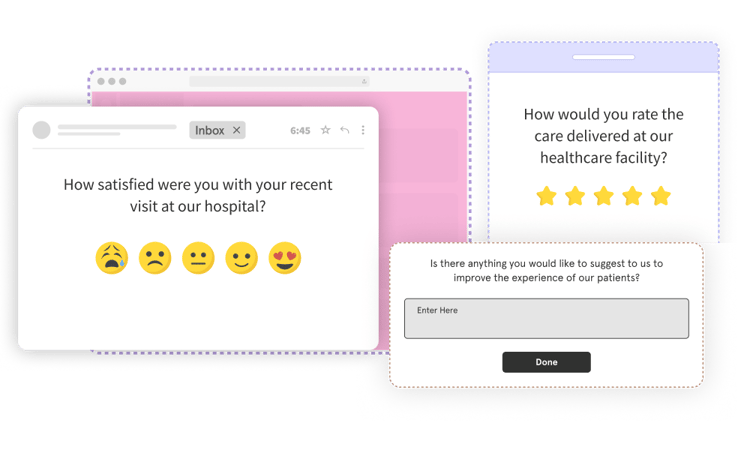
Measuring Patient Experience in Aged Care
In aged care facilities, measuring patient experience is crucial for ensuring the well-being and satisfaction of residents. Collect feedback from residents and their families to understand their experiences with various aspects of aged care. Key touchpoints for sending surveys include:
- Admission Process: Send surveys shortly after the admission to gather feedback on the initial experience.
- Care Quality: Regular intervals (e.g., monthly or quarterly) to assess ongoing care quality.
Caregiver Interactions: After significant interactions or care updates. - Living Environment: Periodically evaluate the cleanliness, comfort, and safety of the facility.
- Food and Nutrition: Regular feedback on meal quality and dietary options.
- Activities and Engagement: Post-event surveys to assess satisfaction with recreational and social activities.
- Medical and Medication Management: After medical appointments or medication changes to gauge understanding and satisfaction.
- Family Communication: Surveys for family members to provide feedback on their interactions with staff and their perceptions of the care provided.
By systematically gathering feedback through these touchpoints, you can identify areas for improvement, enhance the quality of life for residents, and build trust and confidence among families.
Measuring Patient Experience in Pharmacies
In pharmacies, patient experience is largely defined by the efficiency and effectiveness of service, as well as the interactions between patients and pharmacy staff. Key touchpoints for sending surveys include:
- Prescription Fulfillment: Immediately after prescription pickup or delivery to assess the accuracy and efficiency of the service.
- Medication Instructions: Post-consultation to evaluate the clarity and helpfulness of instructions provided.
- Pharmacist Consultations: After one-on-one consultations to gather feedback on the knowledge and communication skills of the pharmacist.
- Service Efficiency: Regularly to measure overall wait times and service speed.
- Additional Health Services: After receiving services like vaccinations or health screenings to assess satisfaction.
- Pharmacy Layout: Periodically to gather feedback on the ease of navigation and accessibility of products.
- Overall Experience: Monthly or quarterly surveys to capture general impressions and identify areas for improvement.
By measuring patient experience at these touchpoints, you can ensure to provide not just medication but also valuable health advice and support, enhancing patient satisfaction and loyalty.
2. Ensure a Frictionless Patient Journey
Identifying and reducing friction points in the patient journey is critical to improving patient experience. Utilize AI-powered patient feedback software to analyze user feedback and patient behavior to pinpoint areas of frustration. Personalized support interactions can significantly reduce patient effort and enhance satisfaction. Implementing AI-driven insights can help streamline processes and tailor services to meet individual patient needs more effectively.
3. Make your processes smoother
Remember that the patients are also suffering due to illness and complex processes add to their sufferings. So always encourage simple processes to make it smoother for the patients to get treated at your hospital or health care centre.
- Develop an easy appointment booking process. Enable appointment booking through phone as well as online channels like website and app.
- The process of admitting a patient to your hospital should be easy and your staff should support the patients and their family members in every possible way.
- The billing and payment process should be smooth and enough payment options should be available for the patients.
- Provide good assistance to the patients to help them claim their medical insurance.
4. Reduce Patient Effort
Strategies to reduce patient effort in navigating the health care system are crucial. Simplify appointment booking, streamline admission and discharge processes, and ensure clear communication about medical instructions. Your organization's culture should be to make patient effort to minimum and serving them in the best way.By making it easier for patients to access care and understand their treatment plans, healthcare providers can significantly improve patient satisfaction and outcomes.
5. Reduce waiting time
Waiting time is another important factor that can make or break a patient experience. For this, you need to streamline your appointment booking process and make sure that the appointment timings are as accurate as possible so that no patients have to wait for long for their consultation.
6. Ensure effective and clear communication with the doctors
Clear and robust communication is necessary to take quality care of the patients and ensure that patients follow all instructions given by the doctor. Encourage your doctors to explain well to the patients about their diagnosis, health condition, treatment plan, medicine course, and all medical instructions. Encourage more written communication which would be easier for both patients and doctors to track the treatment course.
7. Ensure cleanliness and hygiene
Cleanliness and hygiene are crucial factors that not only affect patient experience but also the well-being of the patients. So always ensure that your hospital or clinic premises are clean, sanitized, and well-maintained. Ensure that the best practices for hygiene and preventing infections are followed by everybody in the healthcare system and train your staff well about these aspects and practices.
8. Treat patients with empathy, kindness, and respect
Empathy is paramount in healthcare; it shows that you value the patient as a person and are committed to their well-being. When patients feel that they are being treated with kindness, empathy, and respect, it leads to better experiences as well as better clinical outcomes for the patient’s health.
9. Provide timely follow-up and communication
Follow-up and communication after treatment allow you to monitor patient progress and identify any problems or issues that may arise. This can help ensure that patients receive the necessary support and care to recover fully.
Timely follow-up also prevents the risk of recurrence of the illness and at the same time shows your commitment to end-to-end patient care and wellness.
10. Ensure Patient Safety
Patient safety is also a crucial component of patient experience. Everybody wants to stay only in a safe place, and when it comes to patients, it is necessary that they feel safe while reaching your hospital or clinic, as well as in staying for treatment. Choose a suitable location for your healthcare centre where nobody feels unsafe to visit.
Also ensure patient safety for the inpatients from hazards like fire, electric components and short circuits, animals, and other unwanted elements that may harm the peace and safety of your patients.
11. Avoid unnecessary tests and patient expenditure
Some healthcare providers encourage recommending too many medical tests with no-so-good reasons. It not only affects the finances of the patients but also the increased expenditure gives them added stress which again affects their health and overall well-being. Moreover, it shows that the doctors are not good with diagnosis, and ultimately affects your healthcare business in the long run.
So always follow the best practices of healthcare and follow the approach of fair pricing of medicines, procedures, and medical tests. This may sound less profiteering for the business at the moment but patients notice these aspects and when they recommend your brand to others, it will benefit you in the long run in the form of a good reputation in the industry and more patients will prefer your healthcare services.
Along with these best practices, you should also work on providing the best proactive and reactive care.
Proactive and Reactive Care
In enhancing patient experience, both proactive and reactive care play crucial roles. Understanding and balancing these approaches can significantly improve patient outcomes and satisfaction.
Proactive Care
Proactive care involves anticipating patient needs and taking preemptive measures to address potential health issues before they become serious problems. This approach focuses on prevention, early detection, and continuous monitoring. Key strategies include:
- Preventive Screenings: Regular health check-ups and screenings to catch diseases early when they are most treatable.
- Health Education: Providing patients with information on maintaining healthy lifestyles, managing chronic conditions, and preventing illness.
- Routine Follow-Ups: Scheduling regular follow-up appointments to monitor patient health and adjust treatment plans as necessary.
- Utilizing Technology: Implementing wearable devices and remote monitoring tools to keep track of patient health metrics in real time.
For example, Kaiser Permanente uses a proactive care model that includes health maintenance programs and comprehensive chronic disease management plans, leading to improved health outcomes and patient satisfaction.
Reactive Care
Reactive care, on the other hand, focuses on addressing immediate health issues and responding to patient needs as they arise. This approach is essential for managing acute conditions and emergencies. Key elements include:
- Emergency Response: Providing timely and effective treatment during medical emergencies.
Symptom Management: Addressing patient symptoms promptly to alleviate discomfort and prevent complications. - Responsive Communication: Ensuring that healthcare providers are accessible and responsive to patient concerns and questions.
- Post-Treatment Support: Offering support and follow-up care after a treatment or procedure to ensure proper recovery.
A well-known example is the Cleveland Clinic, which excels in reactive care by offering 24/7 access to specialized medical teams and utilizing advanced technologies to provide immediate and effective patient care.
By integrating both proactive and reactive care strategies, you can offer comprehensive care that not only addresses immediate health concerns but also promotes long-term well-being. This balanced approach enhances the overall patient experience, fostering trust and satisfaction among patients.
Historical Perspective: From Reactive to Proactive Care
The evolution of healthcare from reactive to proactive care marks a significant shift in medical practice. Historically, healthcare systems primarily operated on a reactive basis—addressing health issues as they arose, with a focus on treating acute conditions and emergencies. This approach was necessary due to limited medical knowledge and technological capabilities.
In the early 20th century, medical advancements began to pave the way for a more proactive approach. The discovery of antibiotics, vaccines, and the establishment of public health initiatives highlighted the importance of prevention and early intervention. By the mid-20th century, the rise of chronic diseases such as heart disease and diabetes further emphasized the need for ongoing management and preventive care.
The late 20th and early 21st centuries have seen a significant push towards proactive care, driven by advancements in technology, increased understanding of disease prevention, and a focus on patient-centered care. Electronic health records, wearable health devices, and telemedicine have enabled continuous monitoring and early detection of health issues. Programs focused on lifestyle changes and disease prevention have become integral parts of healthcare.
Today, the integration of AI and big data analytics allows for even more precise and personalized proactive care. By analyzing vast amounts of patient data, healthcare providers can predict potential health issues and intervene early, ultimately improving patient outcomes and reducing healthcare costs. This historical shift from reactive to proactive care reflects a broader transformation towards a more holistic and preventive approach in healthcare.
Let’s explore some questions that you can ask in your patient surveys to collect valuable feedback from your patients and be able to build better patient experiences.
Some Effective Patient Experience Survey Questions
In order to fetch valuable patient experience data to assess patient experience, you need to create powerful patient surveys. Questions are the core of any survey. So we are providing here some effective survey questions that you can use in your patient experience survey to gather useful patient insights about their experiences with your healthcare facility.
Patient Experience Questions for Outpatients
The patients who come for consultation, get treatment and return on the same day are known as outpatients. Here are some questions that you can ask in your surveys for outpatients.
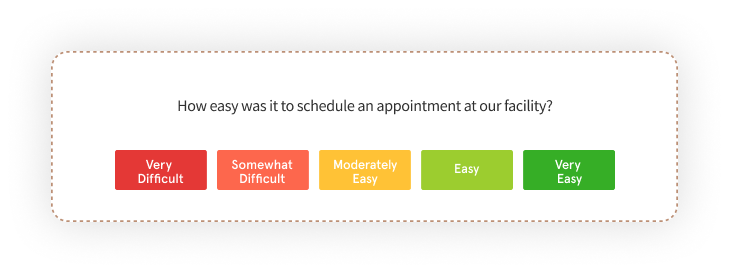
- How would you rate the process of booking an appointment with our doctor?
- How would you rate the accessibility of the location of our clinic?
- How would you rate your recent interaction with the doctor?
- How satisfied are you with the diagnosis made by the doctor?
- How satisfied are you with the medication and treatment provided to you?
- How was your experience with our staff?
- How would you rate the accuracy of the appointment timings?
- How would you rate the cleanliness and hygiene of our clinic?
- How would you rate your overall experience with our healthcare facilities and services?
- Would you like to share any special experience of getting consultation and treatment at our clinic?
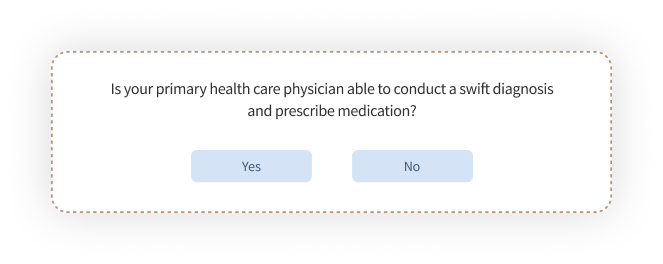
Here is an outpatient feedback template that you can use to gather feedback from your outpatients.
Patient Experience Questions for Inpatients
The patients who get admitted to the hospital or healthcare centre to get treatment and healthcare are known as inpatients. Here are some survey questions that you can ask from your inpatients.
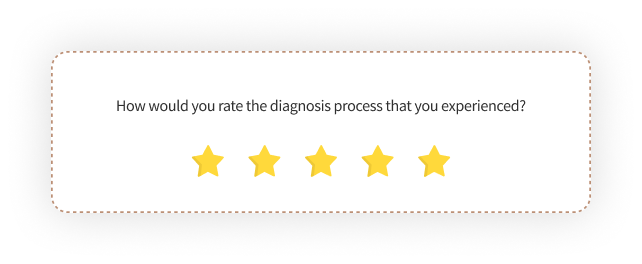
- How would you rate your experience of getting admitted to the hospital?
- How satisfied are you with your recent interaction with the doctor?
- How was your experience of the stay at this hospital?
- How would you rate the health care quality during your stay at the hospital?
- How would you rate your experience with our nurses and other hospital staff?
- How would you rate the cleanliness of the hospital?
- How would you rate the quality of the food provided during the treatment?
- How satisfied are you with the food provided in the hospital cafeteria?
- How was your experience at the hospital pharmacy?
- How would you rate the process of discharge from the hospital?
- Did you get enough assistance from our staff to get your medical insurance claim?
- How would you rate the billing and payment process of the hospital?
- How would you rate your overall experience of getting treatment and healthcare at the hospital?
- Would you like to share any special experiences during your treatment and stay at the hospital? (open-ended question)
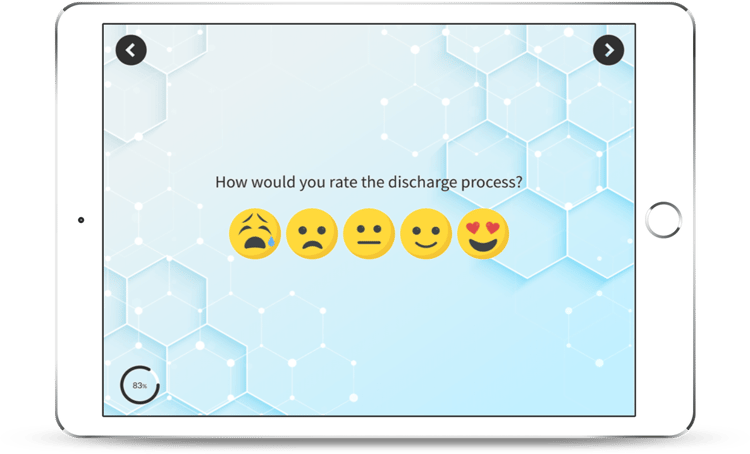
Here is an inpatient feedback template that you can use to create an inpatient experience survey.
Net Promoter Score Survey Question
Net Promoter Score or NPS survey helps you measure patient loyalty in terms of their likeliness to recommend a hospital or clinic to their friends and known ones.
Here is the main NPS survey question which is also known as the Ultimate Question.
Based on your experience with our healthcare services, how likely are you to recommend our healthcare facility to your friends and known ones on a scale of 0 to 10 where 0 means Not at all likely, whereas 10 means most likely to recommend?
This question is also followed up by another question which asks the reason for the patient's rating.
Would you please tell us the reason for your rating? (open-ended follow-up question)
An effective patient experience survey with powerful questions not only helps you collect feedback from the patients but also helps to enhance patients' satisfaction and engagement. Let’s understand the difference between patient experience and engagement.
Patient Engagement vs Patient Experience
Patient experience and patient engagement are two crucial components of healthcare, each playing a distinct role. At the same time, both are interrelated and affect each other. Patient experience covers the entire patient journey with the health care organizations starting from contacting the organization first, focusing on all aspects and interactions with doctors & other staff, and continuing till the last follow-up with the doctor or the organization.
On the other hand, patient engagement refers to the active involvement of patients in their healthcare decisions, treatment plans, and ongoing management of their health. It encourages patients to be informed, motivated, and empowered participants in their own care.
Here are some aspects that will help you understand the relationship and difference between both the terms.
-
Focus - Patient engagement specifically focuses on the active involvement of patients and their family members in healthcare decisions, ongoing treatment, medication, medical instructions provided by the doctors and management of their health conditions. Whereas patient experience focuses on all aspects that affect the satisfaction of the patients and what patients go through during their entire healthcare journey including aspects like patients’ interactions, emotions, healthcare providers’ empathy & courtesy towards patients, and providing healthcare facilities and patient-centered care thereby ensuring the satisfaction of the patients.
-
Scope - The scope of patient engagement is limited and revolves around patients’ involvement in their healthcare. Whereas, patient experience has a broader scope and covers all the aspects in totality that patients go through and interact with while getting treatment and care from healthcare organizations.
-
Relationship - Patient engagement is a component of patient experience. When patients are actively engaged in their care, it often leads to a more positive patient experience. Engaged patients are more likely to have a sense of control and partnership in their healthcare journey, which can enhance their overall satisfaction.
-
Outcomes - The outcome of patient engagement is typically improved patient self-management, increased health literacy, and improved health outcomes, as engaged patients are more likely to actively participate in their care. On the other hand, the outcome of a positive patient experience is often increased patient loyalty & satisfaction, better patient retention, trust in the healthcare system, and recommendations to new patients.
Both patient experience and engagement are important in the healthcare industry to ensure the satisfaction of the patients and grow your business.
Conclusion
Patient experience plays a crucial role in the success of healthcare organizations. Excellent patient experience creates loyal patients with long-lasting relationships, whereas poor experiences lead to patient churn and bad reputations through lousy word-of-mouth. In order to assess patient experience, you need to collect feedback from your patients.
With the help of good patient experience software, you can create effective patient experience surveys and share them with your patients through multiple channels. Feedback helps you measure and improve patients' satisfaction and their overall experience.
Zonka Feedback is one such software that not only enables you to gauge patient experience but also to take action on feedback to close the feedback loop and improve patient experience and satisfaction.
Schedule a demo and see how it works for your healthcare organization and take you towards the heights of success.




.png)







